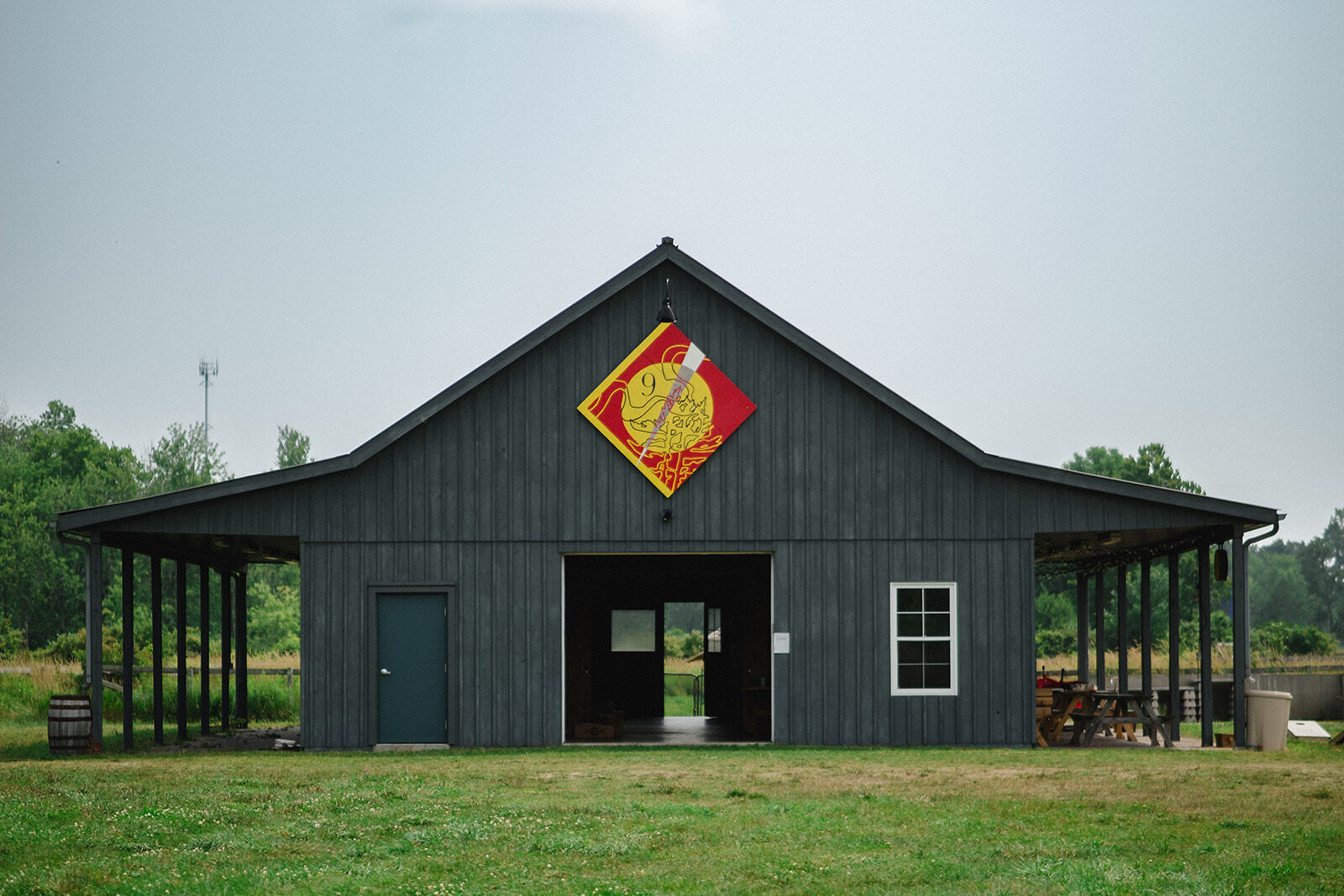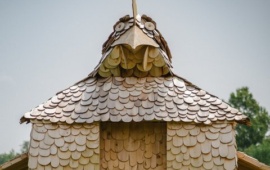
Explore No. 9 Gardens: A Haven for Sustainability, Art, and Community in Rideau Lakes
Tucked away in the serene landscape of Rideau Lakes, No. 9 Gardens is a pioneering example of how sustainability, art, and community can seamlessly intertwine. This innovative public learning center is not just a place to visit — it’s a destination where the future of sustainable living is actively being shaped and shared. Whether you’re an environmental enthusiast, an art lover, or looking for a peaceful retreat, No. 9 Gardens expands over 40 acres and offers a rich and inspiring experience that will leave you with a renewed sense of connection to the earth and its possibilities.
-

No. 9 Gardens
No.9 Gardens is a unique 40-acre Sustainability Centre in the Rideau region.
A Vision of Sustainable Living
At the heart of No. 9 Gardens is a commitment to sustainable living. This commitment is evident in every aspect of the site, from its organic gardens to its renewable energy systems and eco-friendly architecture. The facility is designed as a living model of sustainability, demonstrating how humans can live in harmony with nature by making mindful choices about how we grow food, build homes, and use resources.
Andrew Davis is the founder and executive director of No. 9 Gardens. He and his wife, Elizabeth Lenell Davies founded No.9 Gardens in 2018 to establish a centre for people to experience the culture of sustainability. Elizabeth heads up the garden and is also the director of No.9’s in-class educational program, “Imagining My Sustainable Community.”
Andrew shares the secret to integrating sustainability into daily operations.
“We think about the triple bottom line reading of sustainability that includes economic, social and environmental,” Andrew says. “Much of what we do at No. 9 Gardens is to promote a culture and lifestyle of sustainability. That means we grow organic food from seeds we plant in our greenhouse and train our interns to do this. We use this food to feed our guests and to donate to local food banks. Our guests stay in off-grid yurts that have no electrical needs. They eat breakfast that includes eggs from our free-range chickens that live in a custom-made artistic chicken coop. We also host retreats for groups that want to experience what it is like to live a sustainable lifestyle like the one we offer. This includes workshops that speak to the environment, creativity and Indigenous ways of knowledge.”
The gardens themselves are a testament to this vision. Carefully cultivated using organic practices, these gardens produce a variety of fruits, vegetables, and herbs that are used on-site and serve as a teaching tool for visitors. Through hands-on workshops and educational programs, guests can learn about sustainable agriculture, food security, and preserving our natural resources for future generations.
A Canvas for Art and Architecture
No. 9 Gardens is more than just an agricultural site; it’s a canvas where art and architecture come together to explore the themes of sustainability and environmental stewardship. The facility features a range of art installations and architectural projects that challenge traditional notions of design and encourage visitors to think about their environmental interactions.
“Our background is in art and architecture, and we felt that these disciplines have a major role in defining our collective culture,” Andrew says. “We want to promote a new culture of sustainability as an alternative to a culture of consumption. We think this offers a more meaningful and purposeful way of being — one that does not burden the natural world as much and tries to live in harmony with nature.”
The art at No. 9 Gardens integrates into the landscape with installations that complement and enhance the natural beauty. These works provoke thought, inspire creativity, and foster a deeper understanding of the relationship between art, design, and the environment.
Education and Community Engagement
Education is a cornerstone of the mission at No. 9 Gardens. The site offers educational programs, from workshops on sustainable gardening and renewable energy to more in-depth courses on environmental design and permaculture. These programs are accessible to people of all ages and backgrounds, making No. 9 Gardens a valuable resource for anyone interested in learning more about sustainability.
Andrew says they recently hosted two different retreats: one for a group of art students from the Ontario College of Art and Design, and the other for the Centre for Sustainable Practices in the Arts.
“Each group stayed for five days and participated in group workshops and individual learning. They did art practices in the environment, stayed in our off-grid structures and ate the food prepared from our garden. They also participated in Indigenous-led workshops that spoke to a greater connection to the land and nature. At the end of the five days, we heard how much the participants appreciated the holistic approach to sustainability and enjoyed learning what such a lifestyle could offer them. They said they were more in touch with themselves, their colleagues, and nature because of the experience. They especially mentioned how they had never eaten so healthy for an extended period.”
Participants also appreciated what the outdoor art installations offer regarding the perception of their relationship with the natural world, Andrew adds.
But the learning doesn’t stop at formal programs. No. 9 Gardens is also a hub for community engagement, regularly hosting events, talks, and collaborative projects that connect people around the shared goal of environmental stewardship. Whether it’s a community potluck featuring produce from the gardens or a collaborative art project involving residents, No. 9 Gardens is where people can gather to share ideas, learn from one another, and build a stronger, more sustainable community.
A Focus on Food and Agriculture
Food is at the center of life at No. 9 Gardens. The organic gardens are more than just a source of fresh produce — they are a living laboratory where visitors can learn about sustainable agriculture practices in their gardens and communities. The produce grown at No. 9 Gardens is used in on-site events and workshops, demonstrating how local, organic food can be part of a healthy and sustainable lifestyle.
There are workshops on food preservation, cooking with seasonal ingredients, and the importance of biodiversity in agriculture. These workshops empower participants to make more sustainable food choices.
Public involvement includes workshops open to the public on how to grow your food, Andrew explains. “We have a good donation program that has donated over 5,000 pounds of fresh organic produce to eight local food banks. We are open every weekend to the public free of charge for people to come and find out more about our ‘nine pillars of building a sustainable community.’”
Those nine pillars of the No. 9 Gardens include waste management, water management, alternative energy, agriculture and food security, public art and design, civic engagement, green building design, green space and transportation.
“We provide free self-guided tours of the eco-art exhibition in partnership with Agnes Etherington Art Centre. We also hire locally,” Andrew says. “The first year we offered the eco-art festival, we curated it in-house through an invited list of professional artists with long practices in outdoor environmental art. For the last two years, we have partnered with Agnes and their curator of contemporary art, Sunny Kerr.”
A Place to Connect with Nature
For those seeking a peaceful retreat, No. 9 Gardens offers a tranquil environment where visitors can connect with nature and recharge. The site is a place of reflection and inspiration, where the beauty of the natural world is always within reach. Whether wandering through the gardens, exploring the art installations, or simply sitting quietly by the water, No. 9 Gardens provides a space to slow down, breathe deeply, and reconnect with the earth.
"We aim to stay financially sustainable by offering onsite accommodations. We plan to partner with groups to offer extended stays, including meals and lodging."
At No.9 Gardens, the garden is central to the mission. The team uses it to teach school groups about the benefits of growing food, incorporating health and economic perspectives and offering culinary experiences so students can taste the produce. This hands-on learning aims to leave a lasting impact on students.
They also train post-secondary students in sustainable food systems, and many pursue further education or careers in sustainability. The focus on cultivating the garden represents their commitment to sustainability and reconnecting with the land.
Plan Your Visit
No. 9 Gardens is open to the public on the weekends from 10 a.m. to 5 p.m., and visitors are encouraged to explore the site at their own pace. Whether you’re interested in taking a guided tour, participating in a workshop, or simply enjoying the beauty of the gardens, there’s something for everyone at this unique and inspiring destination.
Andrew says they’ve had some great feedback, especially from the children.
“We have had small children marvel at the taste of a fresh carrot,” he says. “We have had families from France who love the experience of art, nature and fresh food. We have had families come back year after year who just want to experience sleeping in our authentic yurts and kayaking Morton Creek. We also love hearing from the food banks that they appreciate the fresh food we offer to those who can’t usually afford it. These reactions make us feel like we are having a positive impact.”
Andrew says they’re looking forward to future group retreats and building packages that might include biking, hiking, kayaking and Indigenous and nature-based workshops.
“We think this will showcase what No.9 Gardens has to offer,” he says. “We also want to provide more seed-to-table dining opportunities.”
No. 9 Gardens is more than just a destination—it’s a movement toward a more sustainable and connected way of life. By blending the best practices in sustainable agriculture, innovative art, and community engagement, No. 9 Gardens serves as a beacon of hope and a model for the future.
You can choose to stay in prospector-style tents or traditional Mongolian yurts. The yurts are equipped to accommodate up to four people, with four single beds. Yurt guests have access to a shared bathroom, shower facilities, and a fire pit. The site promotes sustainability, offering features like composting toilets and a focus on eco-friendly practices.
The prospector tents can also house up to four people and include a queen-size bed plus two cots. They come with bedding, a cooler, and access to a gas barbecue.
Before you visit, check their website or contact them directly for information on upcoming events, workshops, and other opportunities to get involved. Whether you’re a resident or a visitor to the area, No. 9 Gardens offers a rare opportunity to experience the best of sustainability, art, and community in one beautiful and welcoming place.
No. 9 Gardens are open seasonally from the first weekend in June to the end of September.